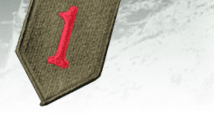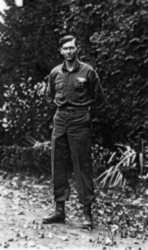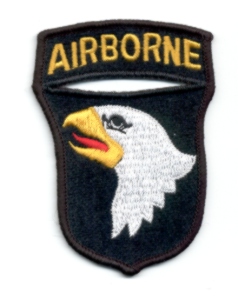A German counterattack (Victor Miller 5th Ranger Bn.)
After this encounter we moved West through the town of Vierville. We special weapons people were really just tagging along through town while the riflemen searched the houses for snipers. We had reached the far side when it became time to settle in for the night. I dug a good slit trench and had a good night's sleep.
St. Marie DuMont; Richard Bostwick
Crossing another small bridge, I counted sixteen dead Krauts laying about in a grotesque fashion. One wearing glasses lay on his back staring straight up at the sky as though watching the clouds pass above him. Another had the side of his head shot away; another, his guts hanging out. Near Saint Marie DuMont we met heavy resistance in a wooded area. When firing broke out we hit the ground and began crawling forward, firing at darting figures. At times torrid bursts of enemy machine gun fire caused the bark to fly from the trees about us, and leaves would flutter down like snowflakes. The wood would be quiet for a time and wild sporadic small arms fire would break out like a rash. The eerie whine of some of the bullets, the quiet zip of those passing quite close became accepted sounds; however that hushed zip was at times unnerving. I would have felt more confident if I had my M-1 instead of that damned pea-shooting carbine. The carbine, it was said, was made to shoot around trees. I was up and down a hundred times and all the while the booming and thrashing sounds of war was all about me. The noise was unbelievable. At times when diving to the ground my face would be against the earth and I would examine the minute particles of dirt or the tiny veins of a leaf. During these moments I was alone with a speck of dirt, or a pebble, a leaf or a bush. All of this was forgotten as we moved on again. It was hot and the stink of perspiration was ever in my nostrils, more painfully in my eyes. The initial goal had been achieved. The Causeways were secured and roadblocks had been setup at the appointed intersections. |

 On my way from the beach too the road on top of the hill, I came across the first dead German soldier. He was all white and waxen that I could hardly believe that this was a dead human and not some dummy that had been planted there to fool us. When we reached the top of the hill we crossed the coast road and moved into a ditch on the other side. Then came a counter-attack and my squads tried to keep as well covered as possible in that ditch. We in the heavy weapons section were always a bit in the back. Colonel Schneider, our battalion commander came along side of us and people started reporting our situation to him. I overheard them say that a boat of F Co. had been swamped, but that all men had been rescued. They had only found one platoon of the two companies of the 2nd Battalion. The rest was missing so far. A lieutenant of artillery reported and said they had only managed to get one gun ashore. Colonel Schneider asked this officer to have this gun fire just in front of our lead troops. The officer replied that that was too close. Colonel Schneider then asked for mortar fire and we set up our mortars and so helped to repel this first attack.
On my way from the beach too the road on top of the hill, I came across the first dead German soldier. He was all white and waxen that I could hardly believe that this was a dead human and not some dummy that had been planted there to fool us. When we reached the top of the hill we crossed the coast road and moved into a ditch on the other side. Then came a counter-attack and my squads tried to keep as well covered as possible in that ditch. We in the heavy weapons section were always a bit in the back. Colonel Schneider, our battalion commander came along side of us and people started reporting our situation to him. I overheard them say that a boat of F Co. had been swamped, but that all men had been rescued. They had only found one platoon of the two companies of the 2nd Battalion. The rest was missing so far. A lieutenant of artillery reported and said they had only managed to get one gun ashore. Colonel Schneider asked this officer to have this gun fire just in front of our lead troops. The officer replied that that was too close. Colonel Schneider then asked for mortar fire and we set up our mortars and so helped to repel this first attack.
 Our participation in the invasion had not, to this point, been as vicious as I had anticipated. Of course, a heavy weapons platoon always brought up the rear and didn't receive the brunt of the close action.
Our participation in the invasion had not, to this point, been as vicious as I had anticipated. Of course, a heavy weapons platoon always brought up the rear and didn't receive the brunt of the close action.